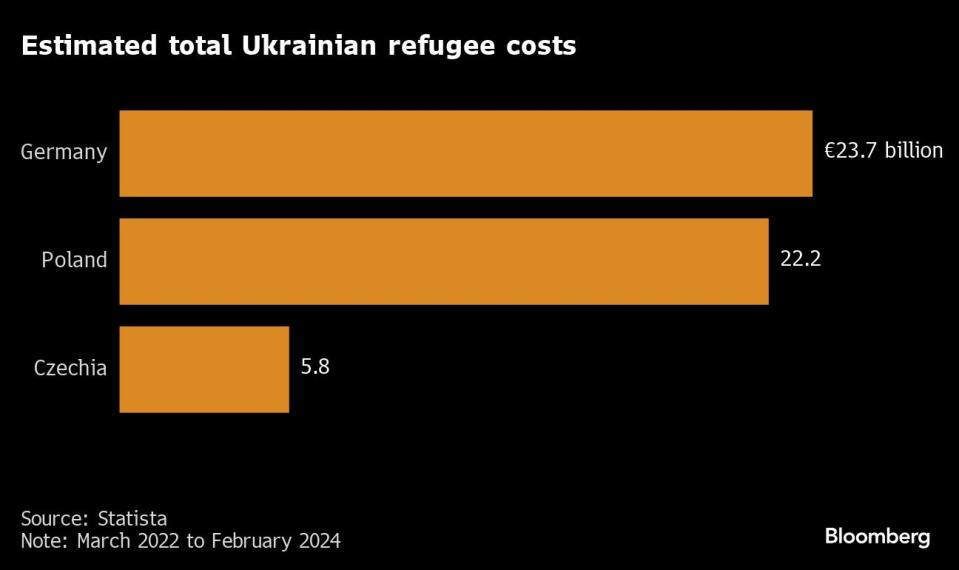Germany, Poland Ask EU to Help Pay for Hosting Ukraine Refugees
(Bloomberg) -- Germany, Poland and the Czech Republic asked the European Union for financial support to help cover the cost of hosting Ukrainian refugees since the three countries have taken in the lion’s share since Russia’s invasion.
Most Read from Bloomberg
SpaceX Tender Offer Said to Value Company at Record $210 Billion
Supreme Court Ends OxyContin Settlement, Cracking Sackler Shield
Biden Struggles as He Spars With Trump on Economy: Debate Takeaways
The leaders of the three central European nations made the request for funding in a joint letter to European Commission President Ursula von der Leyen.
They told the head of the bloc’s executive arm that their countries’ capacities are strained. “More than 50% of Ukrainian refugees who have entered the European Union live in Germany, Poland and the Czech Republic. The uneven challenges for Member States within the EU are also evident in relation to the respective size of the population,” they wrote in the letter, seen by Bloomberg.
The trio said that this situation isn’t compatible with the common objective of sharing the burden of taking in refugees from Ukraine and the consequences for national budgets.
“An additional and — in relation to actual expenses — substantial financial support from the existing funds of the current Multiannual Financial Framework 2021-2027 is needed for those member states particularly affected in order to adequately reflect the expenses of taking in, housing and providing for refugees from Ukraine,” the leaders said.
Speaking to reporters ahead of an EU leaders’ summit in Brussels, Scholz said the question of how much each EU member state contributes to taking in Ukrainian refugees “is not clearly distributed” and noted that Germany, Poland and the Czech Republic had absorbed the bulk of those fleeing the conflict.
The EU should compensate those three nations for things like living costs, vocational training and language courses, Scholz told reporters, adding that this would be part of the discussions at the meeting in Brussels.
Germany has taken in more than 1 million refugees from Ukraine since Russia attacked its smaller neighbor in February 2022. Berlin has spent more than €20 billion ($21.4 billion) on accommodation and integration of those war refugees.
The push comes as Scholz’s ruling coalition is negotiating bitterly about how to set spending priorities in next year’s federal budget with tax revenues coming in weaker than expected. Finance Minister Christian Lindner is insisting on strict borrowing limits which were suspended during the pandemic for several years.
Economic Impact
Since the outbreak of the war, more than 18 million Ukrainians crossed into Poland, the country’s border guard said in a report.
Slightly under 1 million decided to stay, with many finding jobs or establishing their own companies. According to a report from the UN Refugee Agency, known as UNHCR, and Deloitte from March 2024, Ukrainians accounted for between 0.7%-1.1% of GDP in 2023.
The Czech Republic officially hosts 340,000 Ukrainian refugees, who in the first quarter paid almost twice as much in taxes as they received in welfare benefits, according to Labor Ministry data. Among those of working age, 72% are employed, although many have less qualified jobs than they used to hold in Ukraine.
The influx of Ukrainian refugees has helped improve the Czech Republic’s unfavorable demographic trends and ease a shortage of workers in a country that has had more vacancies than those unemployed for most of the past six years, driving rapid wage growth and fanning inflation.
--With assistance from Iain Rogers, Olivia Fletcher, Krystof Chamonikolas and Natalia Ojewska.
Most Read from Bloomberg Businessweek
The FBI’s Star Cooperator May Have Been Running New Scams All Along
RTO Mandates Are Killing the Euphoric Work-Life Balance Some Moms Found
Japan’s Tiny Kei-Trucks Have a Cult Following in the US, and Some States Are Pushing Back
How Glossier Turned a Viral Moment for ‘You’ Perfume Into a Lasting Business
©2024 Bloomberg L.P.

 Yahoo News
Yahoo News 


